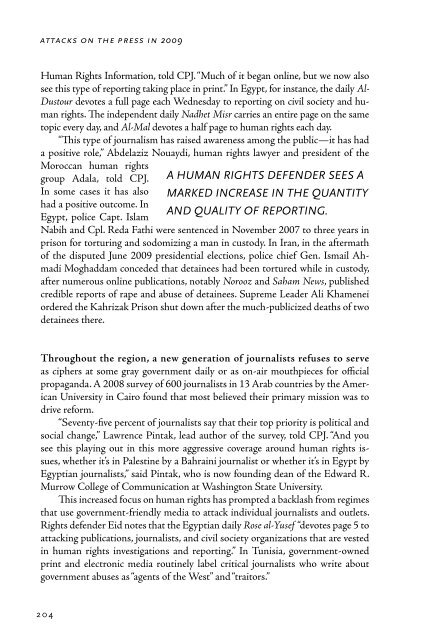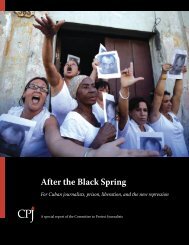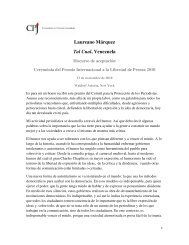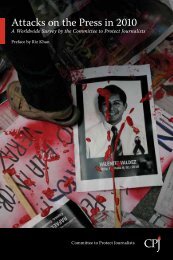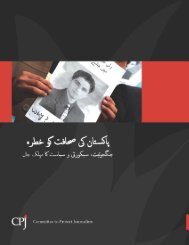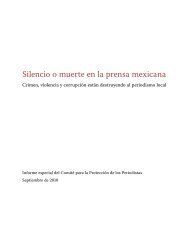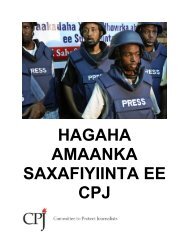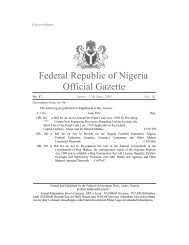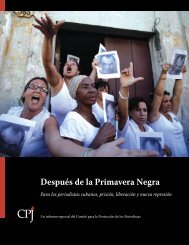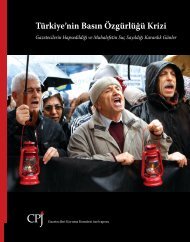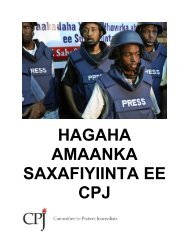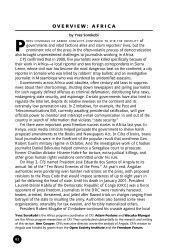Attacks on the Press - Committee to Protect Journalists
Attacks on the Press - Committee to Protect Journalists
Attacks on the Press - Committee to Protect Journalists
- No tags were found...
You also want an ePaper? Increase the reach of your titles
YUMPU automatically turns print PDFs into web optimized ePapers that Google loves.
attacks <strong>on</strong> <strong>the</strong> press in 2009middle east and north africa: analysisHuman Rights Informati<strong>on</strong>, <strong>to</strong>ld CPJ. “Much of it began <strong>on</strong>line, but we now alsosee this type of reporting taking place in print.” In Egypt, for instance, <strong>the</strong> daily Al-Dus<strong>to</strong>ur devotes a full page each Wednesday <strong>to</strong> reporting <strong>on</strong> civil society and humanrights. The independent daily Nadhet Misr carries an entire page <strong>on</strong> <strong>the</strong> same<strong>to</strong>pic every day, and Al-Mal devotes a half page <strong>to</strong> human rights each day.“This type of journalism has raised awareness am<strong>on</strong>g <strong>the</strong> public—it has hada positive role,” Abdelaziz Nouaydi, human rights lawyer and president of <strong>the</strong>Moroccan human rightsgroup Adala, <strong>to</strong>ld CPJ.In some cases it has alsohad a positive outcome. InEgypt, police Capt. IslamA human rights defender sees amarked increase in <strong>the</strong> quantityand quality of reporting.Nabih and Cpl. Reda Fathi were sentenced in November 2007 <strong>to</strong> three years inpris<strong>on</strong> for <strong>to</strong>rturing and sodomizing a man in cus<strong>to</strong>dy. In Iran, in <strong>the</strong> aftermathof <strong>the</strong> disputed June 2009 presidential electi<strong>on</strong>s, police chief Gen. Ismail AhmadiMoghaddam c<strong>on</strong>ceded that detainees had been <strong>to</strong>rtured while in cus<strong>to</strong>dy,after numerous <strong>on</strong>line publicati<strong>on</strong>s, notably Norooz and Saham News, publishedcredible reports of rape and abuse of detainees. Supreme Leader Ali Khameneiordered <strong>the</strong> Kahrizak Pris<strong>on</strong> shut down after <strong>the</strong> much-publicized deaths of twodetainees <strong>the</strong>re.Throughout <strong>the</strong> regi<strong>on</strong>, a new generati<strong>on</strong> of journalists refuses <strong>to</strong> serveas ciphers at some gray government daily or as <strong>on</strong>-air mouthpieces for officialpropaganda. A 2008 survey of 600 journalists in 13 Arab countries by <strong>the</strong> AmericanUniversity in Cairo found that most believed <strong>the</strong>ir primary missi<strong>on</strong> was <strong>to</strong>drive reform.“Seventy-five percent of journalists say that <strong>the</strong>ir <strong>to</strong>p priority is political andsocial change,” Lawrence Pintak, lead author of <strong>the</strong> survey, <strong>to</strong>ld CPJ. “And yousee this playing out in this more aggressive coverage around human rights issues,whe<strong>the</strong>r it’s in Palestine by a Bahraini journalist or whe<strong>the</strong>r it’s in Egypt byEgyptian journalists,” said Pintak, who is now founding dean of <strong>the</strong> Edward R.Murrow College of Communicati<strong>on</strong> at Washingt<strong>on</strong> State University.This increased focus <strong>on</strong> human rights has prompted a backlash from regimesthat use government-friendly media <strong>to</strong> attack individual journalists and outlets.Rights defender Eid notes that <strong>the</strong> Egyptian daily Rose al-Yusef “devotes page 5 <strong>to</strong>attacking publicati<strong>on</strong>s, journalists, and civil society organizati<strong>on</strong>s that are vestedin human rights investigati<strong>on</strong>s and reporting.” In Tunisia, government-ownedprint and electr<strong>on</strong>ic media routinely label critical journalists who write aboutgovernment abuses as “agents of <strong>the</strong> West” and “trai<strong>to</strong>rs.”Morocco has turned <strong>to</strong> a politicized court system <strong>to</strong> muzzle <strong>the</strong> press. In2008, <strong>the</strong> state-run C<strong>on</strong>sultative Council <strong>on</strong> Human Rights sued Al-Jarida al-Oula in an attempt <strong>to</strong> prevent <strong>the</strong> daily from publishing public domain testim<strong>on</strong>yfrom <strong>the</strong> Equity and Rec<strong>on</strong>ciliati<strong>on</strong> Commissi<strong>on</strong>. In June 2008, a Rabat court orderedAl-Jarida al-Oula <strong>to</strong> s<strong>to</strong>p publishing victim testim<strong>on</strong>y. The newspaper appealed<strong>the</strong> ruling even as it c<strong>on</strong>tinued <strong>to</strong> publish excerpts describing <strong>to</strong>rture, murders,and forced disappearances. The ruling was upheld by an appeals court inIn a regi<strong>on</strong>al survey, mostjournalists say <strong>the</strong>irmissi<strong>on</strong> is <strong>to</strong> drive reform.late 2008.In Bahrain, journalists facedprosecuti<strong>on</strong> for reporting <strong>on</strong> humanrights. Maryam al-Shrooqi, ajournalist for Al-Wasat, was triedfor writing an article about alleged religious discriminati<strong>on</strong> in hiring practices at<strong>the</strong> Department of Civil Services. The judge dismissed <strong>the</strong> most serious chargesagainst al-Shrooqi but fined her. Similarly, judicial authorities also sued journalistLamis Deif after she published a series of articles investigating family courtjudges and <strong>the</strong>ir rulings. “The government has created a culture of fear am<strong>on</strong>g reportersand columnists,” Nabeel Rajab, president of <strong>the</strong> Bahrain Center for HumanRights, <strong>to</strong>ld CPJ. “Those few reporters who try <strong>to</strong> write about human rightsare marginalized, threatened, and often prosecuted.”While bloggers and activists are bearing <strong>the</strong> brunt of <strong>the</strong> government counterattack,all journalists are feeling <strong>the</strong> heat. Egypt, Tunisia, Morocco, Saudi Arabia,and Yemen, am<strong>on</strong>g o<strong>the</strong>rs, have at times suspended <strong>the</strong> operati<strong>on</strong>s of satellitenews channels, particularly Al-Jazeera, for highlighting sensitive human rights,political, or religious issues.“There was actually more reporting of human rights kinds of issues and democracykinds of issues a few years ago,” said Marc Lynch, direc<strong>to</strong>r of <strong>the</strong> Institutefor Middle East Studies at George Washingt<strong>on</strong> University. “Over <strong>the</strong> last year orso governments and <strong>the</strong> regimes have hit back quite a bit. The general repressi<strong>on</strong>of <strong>the</strong> media, <strong>the</strong> crackdown <strong>on</strong> democratic activism across <strong>the</strong> regi<strong>on</strong> have alsotaken a <strong>to</strong>ll <strong>on</strong> human rights reporting,” said Lynch, who is well-known in <strong>the</strong>regi<strong>on</strong> for his blogging under <strong>the</strong> name Abu Aardvark. He believes <strong>the</strong> satellitechannels have become a little less daring in <strong>the</strong>ir reporting of late.Al-Jazeera anchor Mohamed Krichen disagrees. “No, our edi<strong>to</strong>rial policy hasnot changed. We report <strong>on</strong> human rights cases when <strong>the</strong>y arise. They are an importantpart of <strong>the</strong> news, but do not c<strong>on</strong>stitute <strong>the</strong> entirety of our coverage. Weare a news organizati<strong>on</strong>, and not a human rights group, and our coverage reflectsthat,” Krichen <strong>to</strong>ld CPJ.“What we have,” said Pintak, a former CBS corresp<strong>on</strong>dent in <strong>the</strong> MiddleEast, “is governments in a halting, tentative, c<strong>on</strong>fused way trying <strong>to</strong> adapt <strong>to</strong> this204205


